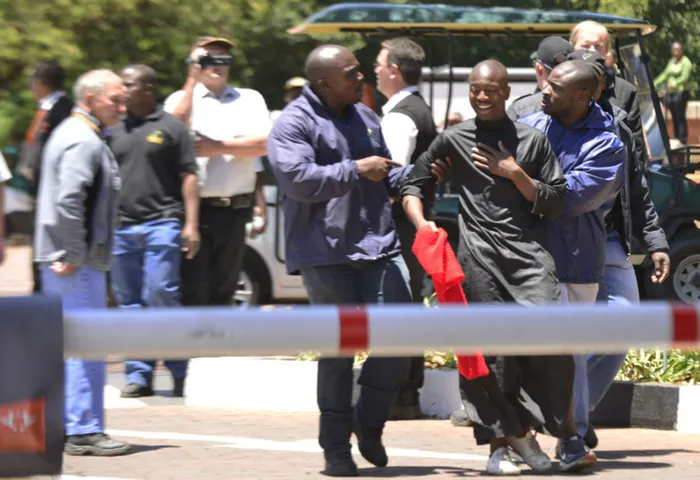
University of Johannesburg security personnel manhandled, assaulted and peppersprayed workers ans students who were inside the yard without any provocation. Here a student leader who tried to make peace is removed from the premises. 051115 Picture: Boxer Ngwenya University of Johannesburg security personnel manhandled, assaulted and peppersprayed workers ans students who were inside the yard without any provocation. Here a student leader who tried to make peace is removed from the premises. 051115 Picture: Boxer Ngwenya
Tebogo Monama and Kgopi Mabotja
POLICE officers watched helplessly as private security guards assaulted and pepper-sprayed protesting University of Johannesburg students and workers yesterday.
The officers were locked outside the gates of the institution’s Kingsway campus during the protests against the outsourcing of mainly cleaners, gardeners and security guards yesterday.
Earlier in the morning, private security guards hired by the university ordered gathered students and workers to stop blocking the gates. When they didn’t, they were slapped and manhandled, and pepper spray was used on them.
UJ Soweto Student Representative Council chairperson Siyabonga Hlabathi walked on to campus to try to calm the protesters, but the guards escorted him off the premises.
Other leaders, including outgoing SRC president Khutso Rammutla, couldn’t enter the campus as they had been served with a letter of suspension. A defiant Rammutla said he refused to accept the suspension letter.
“They were happy when the SRC was silent about outsourcing. Now that we are talking, they suspend us. I don’t owe the university any money. They can suspend me as a student, but not as a leader,” he said.
Four other students, including SRC secretary Mangaliso Mkhonto, have also been suspended.
Thirty workers were banned from campus because they posed a serious danger to the lives of students, according to vice-chancellor Ihron Rensburg.
He said the university was negotiating with workers through their union and other informal representatives.
A task team to deal with outsourcing was expected to sit for their first meeting today to develop an insourcing plan.
“Their brief must develop an insourcing plan as quickly as possible. It must come into effect early next year,” Rensburg added.
In the altercation between the protesters and the security guards, at least eight people were taken to hospital. One student struggled to breathe after being pepper-sprayed, and cleaner Nthabiseng Moloi, who suffers from epilepsy, was injured.
Student Xhama Songwevu was taken to Helen Joseph Hospital after he was hit with a baton on the head and was bleeding profusely. After receiving medical attention, he returned to the protest.
“The guards had been wanting to assault me for days, and the workers knew. When the guards approached, the workers formed a human shield around me. As they couldn’t get to me, they hit me on the head with a baton.”
Frustrated by not being able to enter the campus, protesters burnt tyres at the entrance. But police officers extinguished the fires and warned them against a violent strike. The protesters then tried to force open the gate, and police threw stun grenades at them.
Rensburg defended the move to bring private security guards on to campus, but denied there were any assaults on students and workers. The university had to put its foot down.”
He said the university would look at CCTV footage to see if anyone was assaulted.
Though students were hit by stun grenades, at a media conference Rensburg claimed all four campuses were calm.
In addition to stopping outsourcing, Rammutla said students wanted Rensburg to rethink financial exclusion and cancel the registration fee for returning students.
Despite the protests, Rensburg was adamant that exams would continue as planned today.
He said about 2 000 students were due to write their final year-end exams.
Rensburg said the university had two court interdicts prohibiting students from disrupting the institution.
